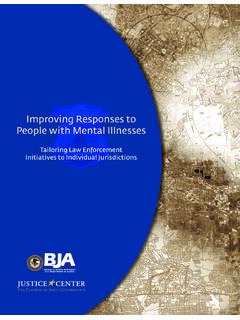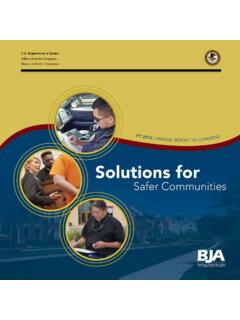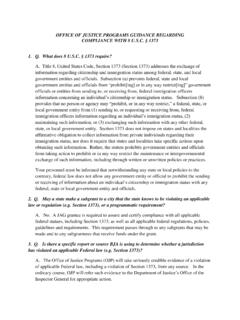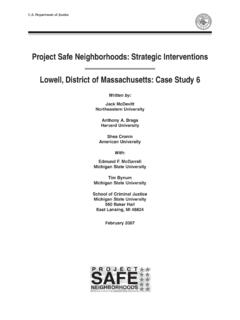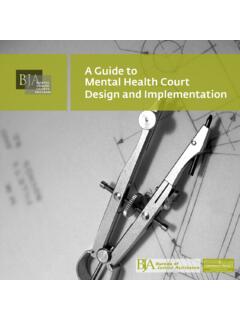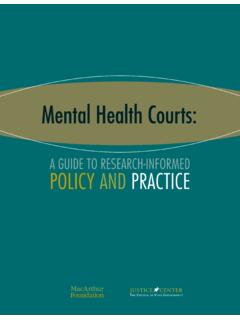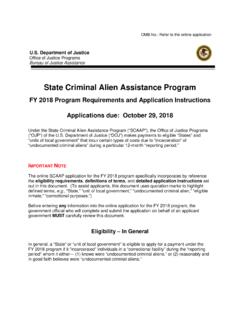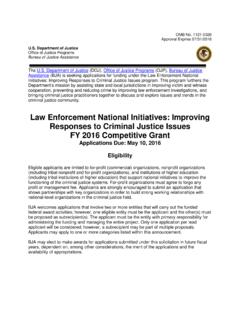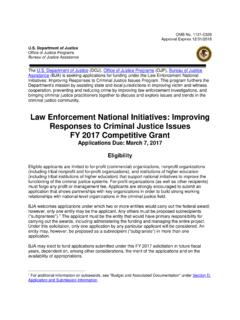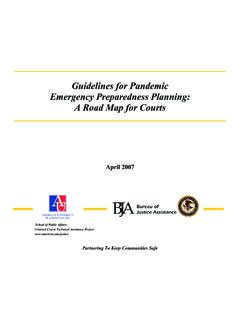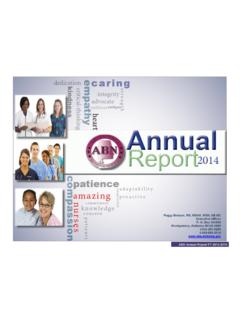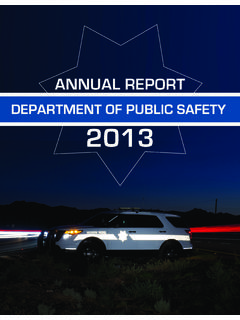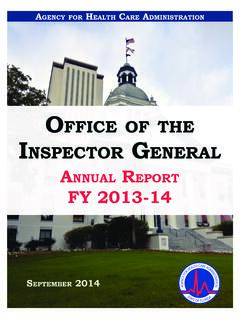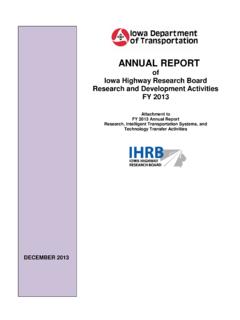Transcription of Annual Report - OJP Bureau of Justice Assistance
1 Justice and Mental Health Collaboration Program (JMHCP) Fiscal Year 2013 This Report was prepared by Rachel Brushett, , CSR, Incorporated under contract #GS-10F-0114L from the Bureau of Justice Assistance . Annual Report J u s t i c e a n d M e n t a l He a l t h C o l l a b o r a t i o n P r o g r a m ( J M H C P ) A n n u a l R e p o r t FY 2013 i Contents Overview .. 1 Justice and Mental Health Collaboration Program .. 1 Grant Activity .. 2 Planning Phase Activities .. 2 Implementation/Expansion Phase Activities .. 3 Law Enforcement Programs .. 3 Direct Service Programs .. 6 Conclusions .. 9 Appendix A. Active Grant Awards .. 10 Appendix B. Key Performance Measures .. 14 J u s t i c e a n d M e n t a l He a l t h C o l l a b o r a t i o n P r o g r a m ( J M H C P ) A n n u a l R e p o r t FY 2013 1 Overview The Justice and Mental Health Collaboration Program (JMHCP) is a grant program designed to increase public safety by facilitating collaboration among the criminal Justice , juvenile Justice , mental health treatment, and substance abuse systems while improving access to effective treatment for people with mental illnesses who are involved with the criminal Justice system.
2 This Report presents an overview of the grant activities of JMHCP grantees over the course of Federal fiscal year 2013 (FY 2013 ). The descriptive analysis presented in this Report is based on quarterly performance data submitted in the Performance Measurement Tool (PMT) by grantees with open and active awards from October 2012 to September 2013 . Justice and Mental Health Collaboration Program JMHCP was created in 2004 to improve criminal Justice services provided to people with mental illness. The program was authorized by the Mentally Ill Offender Treatment and Crime Reduction Act (MIOTCRA) and is administered by the Bureau of Justice Assistance (BJA) to do the following: Encourages early intervention for people with mental illnesses or co-occurring mental health and substance abuse disorders.
3 Maximizes diversion opportunities for multisystem-involved individuals with mental illnesses or co-occurring mental health and substance abuse disorders. Promotes training for Justice and treatment professionals. Facilitates communication, collaboration, and the delivery of support services among Justice professionals, treatment and related service providers, and government partners. JMHCP awards offer financial and technical Assistance to a variety of grantees, including state and local courts and state, local, and Indian tribal governments. This funding assists them with the development, implementation, and expansion of programs. Grants can be used for a broad range of activities, including training practitioners on evidence-based strategies for people with mental illness who come into contact with the criminal Justice system; fostering collaborative relationships between law enforcement, treatment providers, and other stakeholders; and increasing the number and availability of alternative sentencing programs.
4 There are three categories of JMHCP grant awards: Planning, Planning and Implementation, and Expansion. Planning grant recipients focus on developing a collaborative plan with various agencies, including law enforcement, mental health agencies, and substance abuse treatment services. Specific milestones of collaborative planning may include identifying and establishing partnerships as well as having collaborative agencies sign Memorandums of Understanding (MOU) and commit to provide resources for program implementation. Expansion grants are awarded to agencies that have already begun implementing their collaborative plan and are enhancing or expanding the services provided. Activities under this category include increasing the capacity of mental health courts or alternative sentencing programs and expanding ancillary services such as education, housing, and employment.
5 Planning and Implementation grants are hybrid awards that combine both a planning and an implementation element. Grantees first complete the planning phase, completing all of the same activities as Planning grantees. At the completion of this stage, grantees submit a Planning and Implementation Guide for approval to Council of State Governments Justice Center and BJA staff to demonstrate that they have successfully completed all necessary planning After signoff, funds for the implementation phase of the project are released, and grantees complete similar activities as Expansion grantees. However, Expansion 1 For additional information about the Planning and Implementation Guide, please contact the Council of State Governments.
6 2 grantees already have fully functioning programs in place, and they generally are adding components or expanding capacity in some way to meet unmet needs. A total of 123 grantees were active in the October December 2012 reporting period, the majority of whom have Planning and Implementation awards (Table 1). The number of active grantees steadily decreased over the course of FY 2013 due to grant closures. Table 1. Active JMHCP Grantees: October 2012 September 2013 Grant Type Number of Active Awards2 Oct. Dec. 2012 Jan. March 2013 April June 2013 July Sept. 2013 Planning 16 16 13 11 Planning and Implementation 84 80 66 63 Expansion 23 23 21 20 Total 123 119 100 94 Grant Activity3 Although there are three distinct types of awards, there is substantial overlap in the data provided by each type of grantee to BJA s PMT system.
7 Generally, with a specific reporting period, grantees are performing either planning or implementation/expansion activities. As noted above, Planning and Implementation awards have two distinct phases. During the planning phase of a Planning and Implementation award, grant recipients are performing the same tasks and activities as recipients of Planning awards and respond to the same PMT questions. After completing all planning activity and receiving approval from BJA staff to move into the implementation phase of a Planning and Implementation award, grant recipients perform implementation activities similar to those of recipients of Expansion awards and respond to the same PMT questions. As such, all planning data will be analyzed together, regardless of whether or not the grantee is the recipient of a Planning or a Planning and Implementation award.
8 Likewise, all implementation questions will be analyzed together, regardless of whether or not the grantee is the recipient of a Planning and Implementation or an Expansion award. Planning Phase Activities Grantees in the planning stage of their project focus on designing a strategic, collaborative plan to identify and treat people involved with the Justice system who have mental illnesses or co-occurring mental health and substance abuse disorders. A key objective in the planning phase is the development of an effective collaboration, with support from all levels of government; Justice , mental health, and substance abuse treatment services; transportation and housing service providers; and community members and advocates. During FY 2013 , a total of 97 grantees conducted planning phase These include grantees who received Planning as well as Planning and Implementation awards.
9 As seen in the following summary measures, grantees completed many of the target activities for the planning stage. A significant majority of grant recipients (80 percent) are developing programs based on a specific methodology or practice. 96 grantees (99 percent) have a task force or planning committee in place to help guide program implementation. 2 See Appendix A for a listing of active grantees by award type. 3 For more information about how grant activity measures were defined and calculated, see Appendix B. 4 Three grantees received both Planning and Planning and Implementation awards. These grantees are only counted once in this total. 3 94 grantees (97 percent) have compiled a list of mental health, substance abuse, and other service providers and resources for their jurisdiction.
10 94 grantees (97 percent) have identified and selected a target population for their initiative. Grantees Report intending to implement a number of intervention types, including law enforcement officer and mental health services cross-training (54 percent), jail diversion program (41 percent), mental health court (29 percent), specialized probation supervision (24 percent), and other services (48 percent). The most commonly described other service was comprehensive, collaborative programming to address co-occurring disorders. Fifty-six percent of grantees indicated that they are planning to offer more than one type of intervention. 68 grantees (70 percent) plan to use a validated risk/needs assessment tool. 79 grantees (81 percent) plan to collect both outcome and process data.
